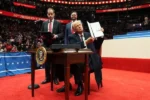Imagine a big city where the mayor, Eric Adams, is in trouble because he’s accused of taking bribes while making important decisions. This situation is not just a simple story; it shows how powerful the U.S. Department of Justice (DOJ) can be, especially under President Trump’s leadership. Recently, the acting Attorney General, Emil Bove, decided to drop the criminal charges against Adams, raising questions about fairness and politics. In this article, we’ll explore what happened in this case and how it could change the way justice is served in America.
| Category | Details |
|---|---|
| Case Overview | Eric Adams, Mayor of New York, faces federal charges for public corruption. |
| Charges | Five counts related to accepting bribes and using political power for personal gain. |
| Attorney General’s Decision | Emil Bove ordered dismissal of the charges, claiming political motivations behind the prosecution. |
| Concerns Raised | Bove’s reasoning for dismissal may weaken future cases and affect other defendants seeking similar dismissals. |
| Legal Process | Judges must agree to dismiss charges; historical rulings may complicate Bove’s decision. |
| Prosecutors’ Independence | Southern District of New York historically operates independently; Bove’s order challenges this. |
| Impact on Future Cases | Bove’s actions may influence how federal prosecutors operate and their decision-making authority. |
| Political Ramifications | Bove’s letter suggests ties to political actions, affecting perceptions of DOJ’s impartiality. |
| Author Background | John P. Fishwick, Jr. is a trial lawyer and former U.S. Attorney. |
Understanding Eric Adams’ Indictment and Its Implications
Eric Adams, the current mayor of New York City, is facing serious legal trouble with a five-count federal indictment related to public corruption. This case has raised many questions about how political power can influence legal decisions. The Department of Justice (DOJ) has the authority to bring charges against public officials, but the decision to drop these charges can also be influenced by political opinions and strategies, making it a complex issue that affects not just Adams, but many others in similar positions.
The dismissal of the charges against Adams by the acting Attorney General, Emil Bove, sends a significant message. Bove’s decision was based on questionable reasoning and could set a precedent for how future cases are handled. If this situation leads to other defendants seeking to dismiss their charges through similar arguments, it could undermine the integrity of the justice system. This case highlights the delicate balance between law and politics and raises concerns about fairness in the legal process.
The Role of the Department of Justice in Political Corruption Cases
The Department of Justice plays a crucial role in addressing political corruption. Cases like that of Eric Adams illustrate how federal prosecutors work to hold public officials accountable for their actions. However, the recent decision by the DOJ to dismiss charges reveals a potential shift in how these cases may be approached in the future. This raises questions about whether justice can be served fairly when political motivations enter the picture, possibly affecting public trust in the legal system.
Moreover, the DOJ’s authority has often been seen as independent, but Bove’s explicit directive challenges this notion. By asserting that all decisions should come from Washington D.C., it suggests a centralization of power that could impact local prosecutors’ ability to act independently. This shift might discourage prosecutors from pursuing politically sensitive cases, fearing repercussions from higher-ups, thereby affecting the overall fight against corruption in public office.
Ripple Effects of the Adams Case on Future Prosecutions
The fallout from the Eric Adams case may have long-lasting impacts on how future prosecutions are conducted. Bove’s controversial decision to dismiss charges based on political grounds could encourage other defendants to challenge their indictments similarly. If this trend continues, it could create a loophole that allows individuals in power to evade accountability, undermining the rule of law and the efforts to combat corruption.
Additionally, the tension between Bove and local prosecutors signifies a shift in how the DOJ will operate under the current administration. By sending a clear message that all decision-making will come from the top, it may deter local officials from pursuing cases they believe are politically sensitive. This could lead to a chilling effect on the prosecution of corruption cases, leaving many offenses unaddressed and potentially allowing corruption to flourish unchecked.
The Implications of Federal Indictments on Political Figures
Federal indictments against political figures, such as Mayor Eric Adams, often serve as a double-edged sword. While they may aim to uphold integrity within public office, they also carry significant political ramifications, potentially influencing the outcomes of elections and governance. In this instance, the allegations against Adams raise questions about the timing and motivations behind such prosecutions, especially in a politically charged environment where accusations of partisanship are rampant.
Furthermore, the fallout from these indictments can create a chilling effect on political discourse. Elected officials may become hesitant to engage in controversial discussions or policy decisions for fear of facing legal repercussions. This could stifle the very essence of democratic debate and accountability, as leaders may prioritize self-preservation over the public interest. The implications of such legal actions extend beyond individual cases, affecting the broader political landscape and public trust in governmental institutions.
The Role of the Department of Justice in Political Corruption Cases
The Department of Justice (DOJ) plays a critical role in addressing political corruption, acting as a watchdog to ensure that elected officials adhere to ethical standards. However, the manner in which the DOJ handles such cases can significantly impact public perception of its impartiality. The recent dismissal of charges against Eric Adams by acting Attorney General Emil Bove raises concerns about the motivations behind DOJ actions, suggesting that political considerations may overshadow the pursuit of justice.
Moreover, the DOJ’s decisions can set precedents that influence future cases. If the dismissal of Adams’ charges is perceived as politically motivated, it could embolden other defendants to challenge their prosecutions based on similar arguments. This potential ripple effect highlights the delicate balance the DOJ must maintain between upholding the law and navigating the complex political landscape, ensuring that its actions are not only legally sound but also seen as fair and just by the public.
Potential Legal Challenges Following Bove’s Directive
Bove’s directive to dismiss the charges against Eric Adams could face significant legal challenges, as the final decision does not solely rest with the DOJ. Under the Federal Rules of Criminal Procedure, judges have the authority to reject such dismissals if they believe it contradicts the public interest. This legal framework underscores the importance of judicial oversight in prosecutorial decisions and ensures that dismissals are not made lightly or for improper reasons.
Additionally, this situation opens the door for greater scrutiny of the DOJ’s internal processes and decision-making. Should the court find Bove’s reasoning inadequate, it may lead to a reexamination of how similar cases are handled in the future. This scrutiny could ultimately strengthen the integrity of the judicial process, reaffirming the principle that justice must be served without bias or political influence, thus preserving public confidence in the legal system.
The Future of Political Prosecutions in a Divided Climate
As political tensions continue to rise, the future of political prosecutions remains uncertain. The Eric Adams case illustrates how such prosecutions can become entangled in partisan conflicts, leading to questions about their legitimacy. If the perception that prosecutions are motivated by political agendas takes hold, it could undermine the effectiveness of the DOJ in combating corruption, as public trust is essential for the agency to operate effectively.
Moreover, the implications of this case extend beyond the immediate parties involved; they could reshape how future administrations approach political corruption cases. If the current trend of politicizing legal actions persists, we may witness a reluctance to prosecute high-profile cases, ultimately allowing corruption to flourish unchecked. The challenge lies in ensuring that accountability remains a priority, regardless of the political climate, to preserve the integrity of public office.
Frequently Asked Questions
What does it mean when someone is indicted for public corruption?
Being **indicted** means that a person is formally accused of a crime. **Public corruption** happens when someone in a government position uses their power for personal gain, like taking bribes.
Who is Eric Adams and what is he accused of?
Eric Adams is the **mayor of New York City**. He is accused of accepting **bribes**, which means he took gifts in exchange for helping a business get city approvals.
What is the role of the Department of Justice (DOJ)?
The **Department of Justice (DOJ)** is a government group that makes sure laws are followed. They investigate crimes and can bring charges against people if they break the law.
Why did the Attorney General decide to drop the charges against Adams?
The **Attorney General**, Emil Bove, said he dropped the charges without looking at the evidence. He claimed they were affecting Adams’ ability to be mayor and run for re-election.
What impact does the dismissal of charges have on other criminal cases?
The decision to drop charges could allow other people accused of crimes to ask for their charges to be dropped too, especially if they claim political reasons were behind their cases.
What does it mean for the DOJ to operate from Main Justice?
When the DOJ operates from **Main Justice**, it means that decisions about cases are made at their main office in **Washington, D.C.**, rather than by local offices. This can change how cases are handled.
Why is this situation important for understanding how government works?
This situation shows how **politics** can influence legal decisions. It helps us understand that sometimes decisions in government may not just be about the law, but also about political power and relationships.
Summary
The content discusses the federal indictment against New York Mayor Eric Adams for public corruption and the recent decision by Acting Attorney General Emil Bove to dismiss the charges. Bove’s reasoning, which includes claims of political motivation and interference with Adams’ reelection, raises concerns about its legal validity and sets a precedent that could influence other criminal cases. The dismissal illustrates a shift in DOJ authority, centralizing decision-making in Washington, D.C., and potentially inviting challenges from other defendants. Overall, this situation highlights the complexities and political implications of prosecutorial discretion within the DOJ.







